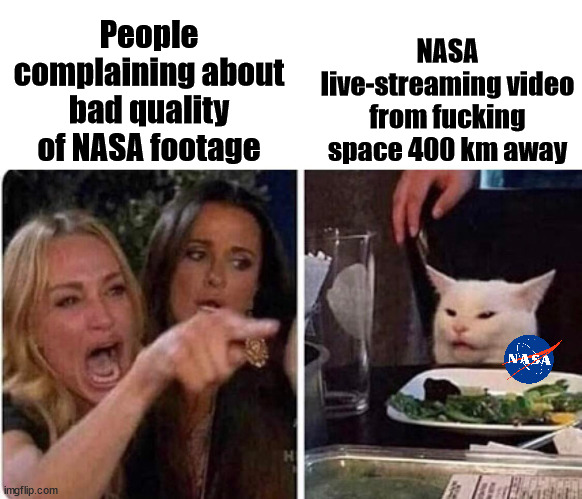this post was submitted on 17 Apr 2024
1070 points (98.7% liked)
Science Memes
14500 readers
1445 users here now
Welcome to c/science_memes @ Mander.xyz!
A place for majestic STEMLORD peacocking, as well as memes about the realities of working in a lab.

Rules
- Don't throw mud. Behave like an intellectual and remember the human.
- Keep it rooted (on topic).
- No spam.
- Infographics welcome, get schooled.
This is a science community. We use the Dawkins definition of meme.
Research Committee
Other Mander Communities
Science and Research
Biology and Life Sciences
- [email protected]
- [email protected]
- [email protected]
- [email protected]
- [email protected]
- [email protected]
- [email protected]
- [email protected]
- [email protected]
- [email protected]
- [email protected]
- [email protected]
- [email protected]
- [email protected]
- [email protected]
- [email protected]
- [email protected]
- [email protected]
- [email protected]
- [email protected]
- [email protected]
- [email protected]
- [email protected]
- [email protected]
- !reptiles and [email protected]
Physical Sciences
- [email protected]
- [email protected]
- [email protected]
- [email protected]
- [email protected]
- [email protected]
- [email protected]
- [email protected]
- [email protected]
Humanities and Social Sciences
Practical and Applied Sciences
- !exercise-and [email protected]
- [email protected]
- !self [email protected]
- [email protected]
- [email protected]
- [email protected]
Memes
Miscellaneous
founded 2 years ago
MODERATORS
you are viewing a single comment's thread
view the rest of the comments
view the rest of the comments

400km is nothing, if you have/had satellite TV the signal comes from a geostationary orbit (35 786 km) and it has to get there first and if you're not exactly below the satellite it's even farther away. Streams from the ISS having low quality (do they actually have low quality?) is due to either bad cameras or cameras aging faster in space due to high energy particles hitting it.
The ISS also moves relative to the receiver, whereas geostationary satellites don't.
I feel like "moves relative" also understates just how fast it moves: ~19,000mph
It's a trade-off, either you have to do tracking and compensate for doppler shift or you have to deal with really bad SNR.